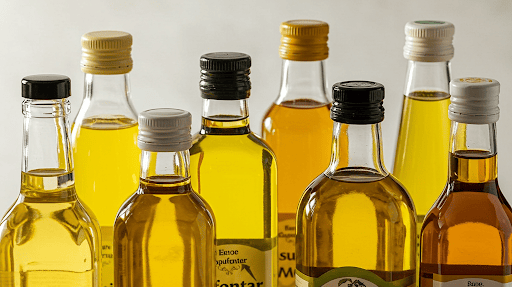Cargill’s Innovative Process for Reducing Phthalates in Vegetable Oils
BEVERAGES


This is an AI generated illustration and does not represent actual product or service.
In recent years, concerns over the presence of phthalates in food products have grown due to their potential health risks. Phthalates, a class of lipophilic chemicals commonly used in plastics, can contaminate edible oils during processing and storage. These compounds, particularly short-chain phthalates like di-2-ethylhexyl phthalate (DEHP) and di-butyl phthalate (DBP), have been linked to adverse health effects, prompting the need for effective methods to reduce or eliminate them from edible oils. Cargill has developed an innovative process to address this challenge, offering a solution that significantly reduces phthalate levels in vegetable oils while maintaining their quality and safety.
The Problem: Phthalates in Edible Oils
Phthalates are widely used in industrial applications, including the production of plastics, adhesives, and coatings. Due to their fat-soluble nature, they can migrate into edible oils during processing, packaging, or storage. Crude vegetable oils, extracted from seeds or fruits, are not suitable for human consumption due to the presence of impurities such as free fatty acids, phosphatides, and pigments. These oils undergo a refining process that typically includes degumming, bleaching, and deodorization to make them safe and palatable. However, conventional refining methods are not fully effective at removing phthalates, leaving trace amounts that can pose health risks.
The presence of phthalates in edible oils is a significant concern for both consumers and manufacturers. Regulatory agencies worldwide are increasingly scrutinizing these compounds, and there is a growing demand for safer, cleaner food products. Cargill’s patented process addresses this need by providing an efficient and effective method for reducing phthalate levels in vegetable oils.
The Solution: High-Temperature Stripping in a Stripping Column
Cargill’s patent pending invention revolves around a novel refining process that uses high-temperature stripping to remove phthalates from vegetable oils. The process involves subjecting the oil to evaporation in a stripping column under specific conditions of temperature, pressure, and residence time. Key features of the process include:
1. High Temperature and Low Pressure: The oil is heated to temperatures between 270°C and 320°C and subjected to a vacuum pressure of 1 to 4 mbar. These conditions facilitate the evaporation of phthalates, which have low volatility, without degrading the oil.
2. Short Residence Time: The oil spends less than 20 minutes in the stripping column, with preferred residence times ranging from 1 to 10 minutes. This short duration minimizes the formation of unwanted by-products, such as trans fatty acids and polymerization products, which can occur at high temperatures.
3. Stripping Column Design: The process utilizes a stripping column equipped with structured packing, which enhances the interaction between the oil and the stripping agent (typically steam). The packing has a specific surface area of 100 to 750 m²/m³, ensuring efficient removal of phthalates.
4. High Yield: The process achieves a high yield of refined oil, with more than 90% of the input oil retained as a phthalate-reduced retentate. The remaining fraction, containing concentrated phthalates, is removed as a distillate.
How It Works: The Science Behind the Process
The effectiveness of Cargill’s process lies in its ability to target phthalates while preserving the quality of the vegetable oil. Phthalates, being lipophilic, are difficult to remove through conventional refining steps like degumming, bleaching, and deodorization. However, the high-temperature stripping process leverages the volatility of phthalates under vacuum conditions, allowing them to be separated from the oil.
- Degumming and Bleaching: The crude oil is first degummed to remove phosphatides and bleached to improve color and remove impurities. These steps prepare the oil for the final phthalate removal process.
- High-Temperature Stripping: The oil is then subjected to evaporation in the stripping column. The combination of high temperature and low pressure causes the phthalates to volatilize, while the short residence time prevents thermal degradation of the oil.
- Deodorization: After stripping, the oil may undergo a final deodorization step at lower temperatures (below 270°C) to remove any remaining volatile compounds and improve flavor.
Benefits of Cargill’s Process
Cargill’s innovative process offers several advantages for both manufacturers and consumers:
1. Significant Reduction in Phthalates: The process reduces phthalate levels by at least 50%, and in some cases by up to 70%, compared to conventional refining methods. This ensures that the final product meets stringent safety standards.
2. Preservation of Oil Quality: By minimizing the formation of trans fatty acids and polymerization products, the process maintains the nutritional and sensory qualities of the oil.
3. High Efficiency: The short residence time and high yield make the process economically viable for large-scale production.
4. Versatility: The process can be applied to a wide range of vegetable oils, including soybean oil, palm oil, sunflower oil, and canola oil, making it a versatile solution for the industry.
5. Regulatory Compliance: With increasing regulatory scrutiny of phthalates, Cargill’s process helps manufacturers comply with safety standards and meet consumer demand for cleaner products.
Applications and Future Implications
Cargill’s phthalate-reduction process has broad applications in the food industry, particularly in the production of cooking oils, margarines, and other fat-based products. By ensuring lower phthalate levels, the process enhances the safety and appeal of these products for health-conscious consumers.
Moreover, the process aligns with global trends toward cleaner labels and safer food production. As regulatory agencies continue to tighten restrictions on phthalates and other contaminants, this innovation positions the company as a leader in food safety and sustainability.
By combining high-temperature stripping with precise control of pressure and residence time, the process effectively removes harmful phthalates while preserving the integrity of the oil. This innovation not only addresses a critical health concern but also sets a new standard for the edible oil industry.


